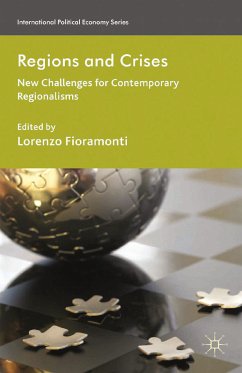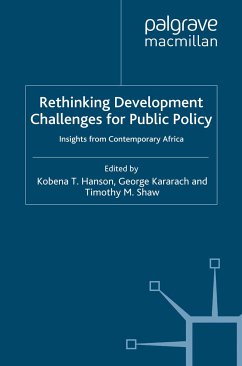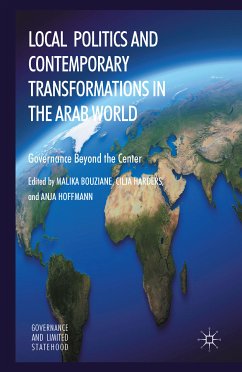
Lorenzo Fioramonti
eBook, PDF
Regions and Crises (eBook, PDF)
New Challenges for Contemporary Regionalisms

PAYBACK Punkte
20 °P sammeln!






Investigates the intimate relationship between regional governance processes and global crises. Analysing the current turmoil in the European Union, it also looks at regional cooperation and integration in the Arab world, Africa, Asia and Latin America through topical case studies.
Dieser Download kann aus rechtlichen Gründen nur mit Rechnungsadresse in A, B, BG, CY, CZ, D, DK, EW, E, FIN, F, GR, HR, H, IRL, I, LT, L, LR, M, NL, PL, P, R, S, SLO, SK ausgeliefert werden.
JEAN-PIERRE CASSARINO Professor at the Robert Schuman Centre for Advanced Studies, Italy MICHELA CECCORULLI Researcher at the Forum on the Problems of Peace and War and a fellow at the University of Bologna, Italy SØREN VON DOSENRODE Jean Monnet Professor of European Politics and Administration at Aalborg University, Denmark PATRICK HOLDEN Lecturer in International Relations at the Plymouth Business School, University of Plymouth, UK EKATERINA KOLDUNOVA Deputy Dean of the School of Political Affairs, Moscow State University of International Relations, Russia ELENA LAZAROU Assistant Professor at the Center for International Relations of the Getulio Vargas Foundation (FGV), Rio de Janeiro, Brazil PATRICK LEBLOND Associate Professor in the Graduate School of Public and International Affairs at the University of Ottawa, Canada ERIC MOSINGER is a PhD candidate at the University of California Irvine, USA DIMPHO MOTSAMAI Researcher in the Africa Conflict Prevention Program (ACPP) of the Institute for Security Studies (ISS), South Africa MZUKISI QOBO Political risk and international relations consultant MARIO TELÒ Vice-President of the Institute of European Studies, Université Libre de Bruxelles, Belgium NATHALIE TOCCI Deputy Director of the Istituto Affari Internazionali, Italy WOLFGANG ZANK Associate Professor, Aalborg University, Denmark
Produktdetails
- Verlag: Palgrave Macmillan UK
- Seitenzahl: 242
- Erscheinungstermin: 26. Juni 2012
- Englisch
- ISBN-13: 9781137028327
- Artikelnr.: 45971800
'An essential reading for anyone interested in a deeper understanding of how crises affect regionalism throughout the world, with a particular emphasis on the long-term implications of the current European crisis.' Amitav Acharya, American University, Washington, DC, USA, and UNESCO Chair in Transnational Challenges and Governance
'Crises have been part of the process of supra-national regional integration starting with the one in Europe. Will the contemporary economic-financial crisis prove to be 'good' or 'bad' for the regionalisms of the world? Will crises compel regions to adapt by increasing or decreasing their mutual commitments? This book is a path-breaking effort to answer these crucial questions with regard to Europe,
'Crises have been part of the process of supra-national regional integration starting with the one in Europe. Will the contemporary economic-financial crisis prove to be 'good' or 'bad' for the regionalisms of the world? Will crises compel regions to adapt by increasing or decreasing their mutual commitments? This book is a path-breaking effort to answer these crucial questions with regard to Europe,
Mehr anzeigen
Africa, South America and East Asia.' Philippe C. Schmitter, European University Institute, Florence, Italy and Central European University, Budapest, Hungary
'Like no one else before, this outstanding book brings together two of the most important traits of the 21st century: crises and regionalism. Moreover it manages to bridge the unfortunate divide between European integration studies and comparative regionalism. Simply a 'mustread' for anyone who wants to understand contemporary world affairs.' Fredrik Söderbaum, School of Global Studies, University of Gothenburg, Sweden
'This book provides an innovative perspective on regional integration and shows how crises can open up new spaces for action. It providesinvaluable insights on the future of Europe and for students of regionalism across the globe.' Martin Holland, National Centre for Research on Europe, University of Canterbury, Christchurch, New Zealand
'This volume is valuable to academics and students with an interest in the Euro crisis and its consequences for regionalism, as well as in the state of integrative efforts in Africa, South America and East Asia and their responses to key challenges both internal and external in nature.' - Matthew Doidge, ANZJES
'This book has the great merit of having explored the phenomenon of regionalism from an unconventional perspective (comparative and in relation to crises) and of having asked a number of good questions, of which there was a desperate need.' - Sonia Lucarelli, The International Spectator
'Like no one else before, this outstanding book brings together two of the most important traits of the 21st century: crises and regionalism. Moreover it manages to bridge the unfortunate divide between European integration studies and comparative regionalism. Simply a 'mustread' for anyone who wants to understand contemporary world affairs.' Fredrik Söderbaum, School of Global Studies, University of Gothenburg, Sweden
'This book provides an innovative perspective on regional integration and shows how crises can open up new spaces for action. It providesinvaluable insights on the future of Europe and for students of regionalism across the globe.' Martin Holland, National Centre for Research on Europe, University of Canterbury, Christchurch, New Zealand
'This volume is valuable to academics and students with an interest in the Euro crisis and its consequences for regionalism, as well as in the state of integrative efforts in Africa, South America and East Asia and their responses to key challenges both internal and external in nature.' - Matthew Doidge, ANZJES
'This book has the great merit of having explored the phenomenon of regionalism from an unconventional perspective (comparative and in relation to crises) and of having asked a number of good questions, of which there was a desperate need.' - Sonia Lucarelli, The International Spectator
Schließen
Für dieses Produkt wurde noch keine Bewertung abgegeben. Wir würden uns sehr freuen, wenn du die erste Bewertung schreibst!
Eine Bewertung schreiben
Eine Bewertung schreiben
Andere Kunden interessierten sich für











